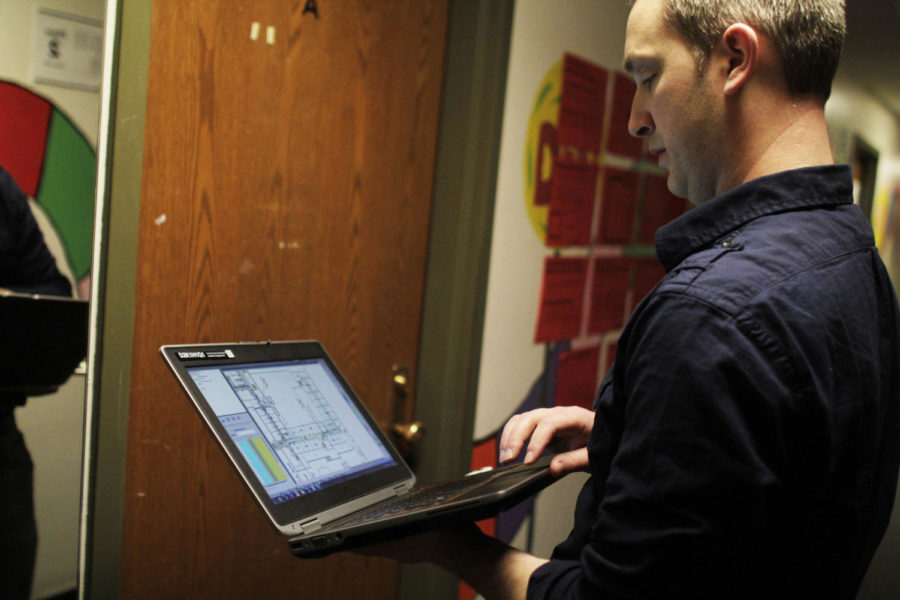Residence hall Wi-Fi connection to be improved
Kelby Wingert/Iowa State Daily
Mike Broders, IT Services engineer working on the wireless project, walks through Friley Hall, recording data for the project. Engineers like Broders are mapping the coverage and signal strength of the Wi-Fi in all the campus residence halls and academic buildings.
February 19, 2014
Due to an increase in Internet outages and drops in service, as well as complaints by students, a system upgrade is in the works.
“We need to keep serving students well and right now, the No. 1 headache we’re dealing with is wireless,” said Peter Englin, director of residence.
The system installed five years ago was designed to accommodate about one device per student, but now as students come to campus with a multitude of devices: laptops, tablets, gaming systems, phones and more — the system cannot keep up.
“Right now, almost everything is wireless, so at this point, students have high expectations but are using a lot of bandwidth,” Englin said. “But because we have high-density living, students are expecting it to be improved.”
The current system has 769 access points that allow for 100 MB service for its range. The new system will replace the current 769 with access points that offer 900 MB services, as well as add 1,000 new access points to the 19 residence halls and 29 Fredericksen Court buildings.
“Each access point will be 900 percent faster, but they don’t have as far a signal strength,” said Cole Staudt, freshman in political science and the information technology director for the Inter-Residence Hall Association. “So to combat that, they’re adding 1,000 more — more than double how many access points the residence halls have now — that will increase our system capacity by 2,000 percent.”
The Department of Residence has been working with IRHA and ITS for more than a year to come up with a solution that is feasible and cost-effective.
“Typically, there’s a life-cycle of every system, so we’re always planning and working on the next best system, but it all depends on funding,” said Jennifer Lohrbach, senior systems analyst in ITS networks and communications.
The existing 769 access points will be replaced for no cost because of monthly fees already paid. The project will cost $1.5 million to install the additional access points, a cost that does not affect an increase in student residential fees.
Now that an agreement has been made, the upgrade is in progress.
Currently, ITS is mapping out each building by surveying the amount of connectivity in each residence hall and almost every room. This will help them better understand the areas of low connectivity, as well as how to customize the system for the needs of each building.
The survey process will take a month to complete. Once the results are returned, hired contractors will begin replacing and installing the new system.
DOR hopes that by Fall 2014, the new system will be up and running, allowing returning residents to see a significant increase in the wireless connection provided.
“The idea is that it might not be until August that we’re all done, but when they come back, students will say ‘wow, the Internet service is incredible,’ and that would be ideal,” Englin said.
After which, a second mapping survey will begin to ensure the system is working effectively.
“We’ve tried solutions in the past that haven’t satisfied students to the level we desire, and that’s what we want — to satisfy students — and [with the current plan], we’re heading there now,” Englin said.
But because not all connectivity problems are due to the outdated Wi-Fi system, ITS and the DOR offer tips to work with the current system.
“There are a number of devices that aren’t even registered with the network which ensures the proper connection, as well as just double checking their connection to an Iowa State network,” Lohrbach said.
Students are encouraged to call the Solution Center when they experience an Internet outage at 515-294-4000.

















